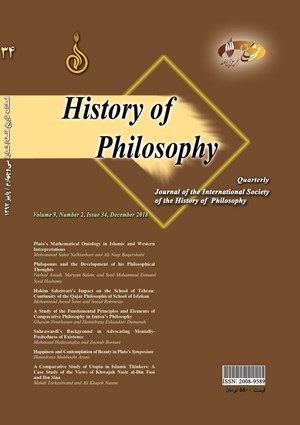-
-
List of Articles
-
Open Access Article
1 - Suhrawardi’s Background in Advocating Mentally-Positedness of Existence
Mahmoud Hedayatafza Zeynab Bostani -
Open Access Article
2 - A Study of the Fundamental Principles and Elements of Comparative Philosophy in Izutsu’s Philosophy
Hamidreza Eskandari Ghasem Purhassan -
Open Access Article
3 - Happiness and Contemplation of Beauty in Plato’s Symposium
Hamidreza Mahboobi Arani -
Open Access Article
4 - Philoponus and the Development of his Philosophical Thoughts
Farhad Assadi -
Open Access Article
5 - Foreword
Hossein Kalbasi Ashtari -
Open Access Article
6 - Plato’s Mathematical Ontology in Islamic and Western Interpretations
Mohammad Saket Nalkiashari Ali Naqi Baqershahi -
Open Access Article
7 - Hakim Sabziwari’s Impact on the School of Tehran: Continuity of the Qajar Philosophical School of Isfahan
Mohammad Javad Sami Saeed Rahimian -
Open Access Article
8 - A Comparative Study of Utopia in Islamic Thinkers: A Case Study of the Views of Khwajah Nasir al-Din Tusi and Ibn Sina
Mahdi Torkashvand Ali Khajeh Naieni
-
The rights to this website are owned by the Raimag Press Management System.
Copyright © 2017-2026







